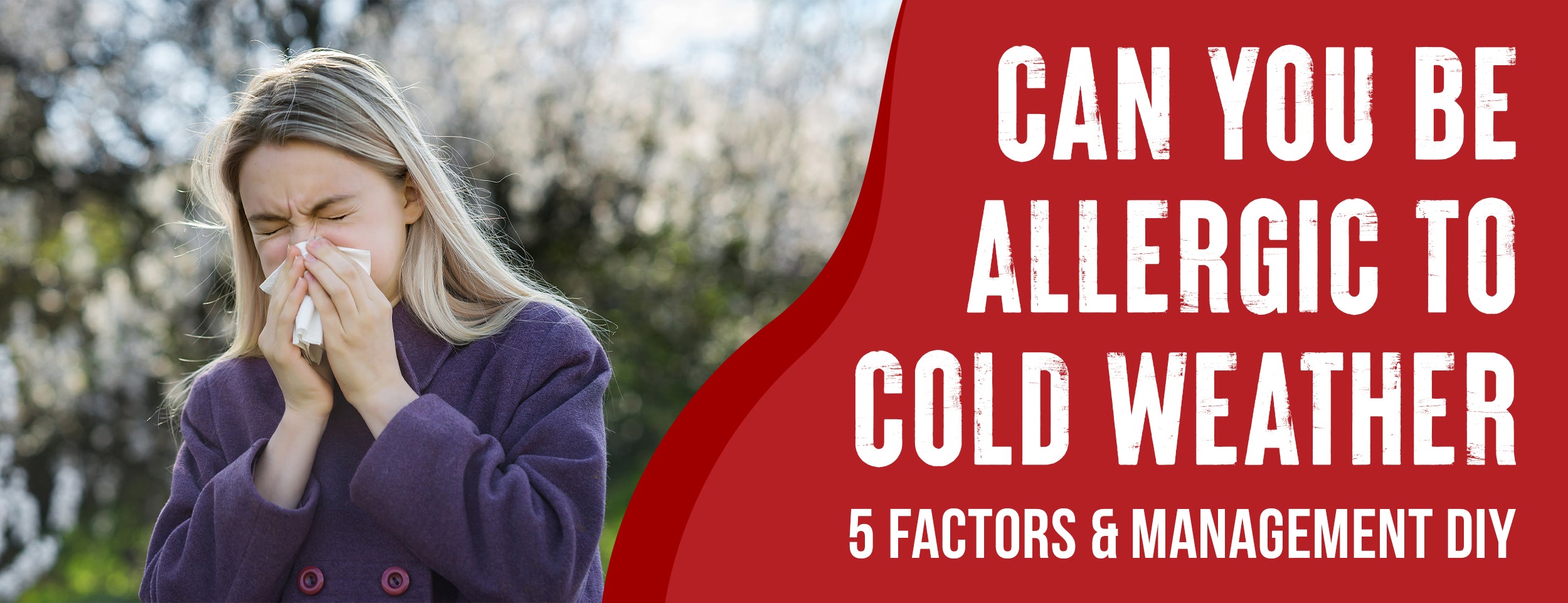Allergic skin irritation occurs when the skin reacts to certain substances, triggering an immune response. These substances range from pollen and dust to cosmetics, metals, and certain foods.
When exposed to these triggers, the skin may display various symptoms, including redness, itchiness, swelling, and blistering. These symptoms can cause discomfort and sometimes even pain. It's important to note that allergy skin irritation can also indicate an underlying disease or disorder, such as eczema, hives, or contact dermatitis.
This article will delve into the common causes, symptoms, diagnosis, treatment, and preventive measures of allergy skin irritation. We aim to provide you with a comprehensive understanding of this condition and empower you to effectively manage and alleviate its effects.
Allergy Skin Irritation: Common Causes
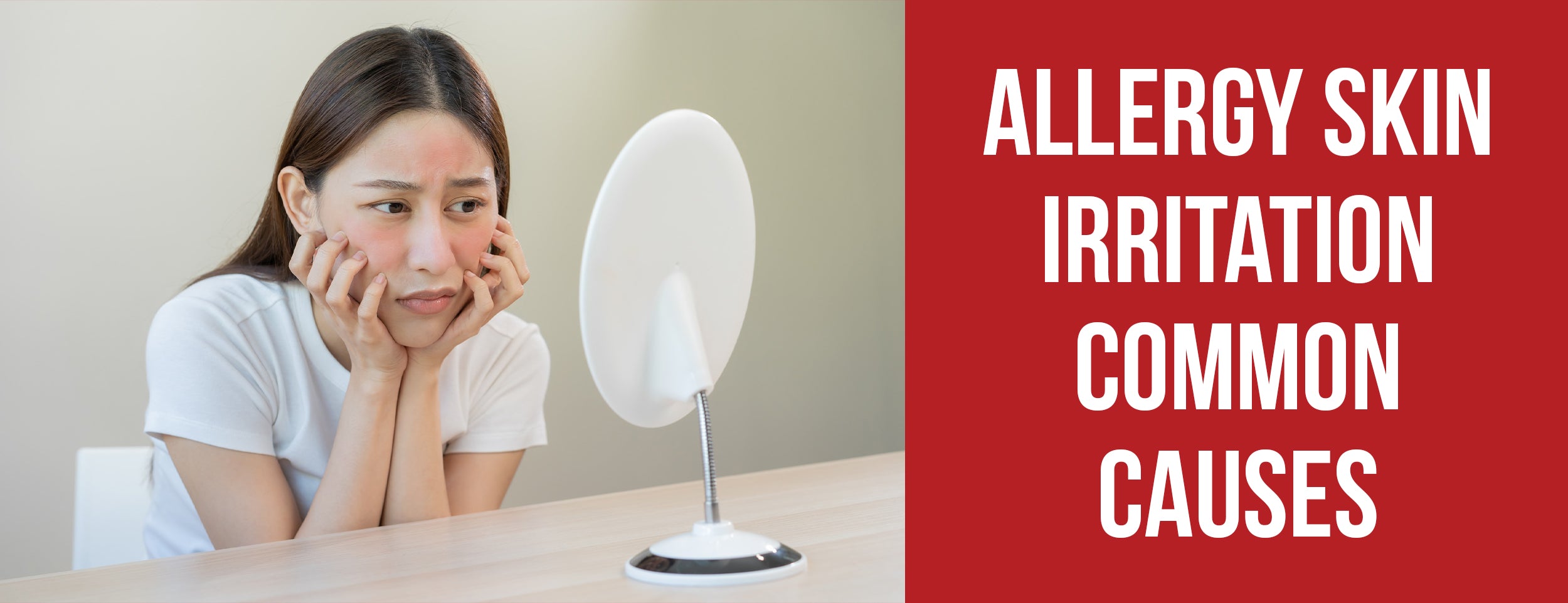
Skin irritation caused by allergies can stem from various factors, depending on the type and severity of the reaction. Here are some common causes:
- Environmental allergens: These substances, like pollen, dust mites, mold spores, animal dander, and insect venom, can trigger allergic reactions when they come into contact with the skin.
- Contact allergens: Substances like metals (such as nickel), latex, rubber, fragrances, dyes, preservatives, and plants (such as poison ivy) can cause allergic reactions upon direct skin contact.
- Food allergens: Some foods or ingredients like peanuts, tree nuts, eggs, milk, soy, wheat, fish, and shellfish can trigger allergic reactions when ingested or absorbed through the skin.
- Medication allergens: Drugs or substances like antibiotics, painkillers, antihistamines, and topical creams can induce allergic reactions when taken orally or applied to the skin.
- Other factors: Various conditions or factors, including stress, hormonal changes, infections, genetic predisposition, and immune system disorders, can increase the risk or severity of allergy-related skin irritation.
Allergy Skin Irritation: Identifying Symptoms
Allergy skin irritation symptoms can vary based on the cause and reaction type. Common indicators include:
- Redness: Increased blood flow and inflammation can cause the skin to appear flushed.
- Itching: Histamine release and chemical stimulation may result in an itchy or prickly sensation.
- Swelling: Accumulation of fluid and tissue expansion can cause puffiness.
- Blisters: Small fluid-filled bumps or vesicles may form, potentially bursting and oozing.
- Rash: The skin can develop raised or flat lesions varying in shape, size, color, and texture.
- Dryness: Moisture loss and natural oils may lead to dry or scaly skin.
- Cracking: Damaged and irritated skin can crack or peel.
- Pain: Inflammation and pressure can make the skin feel sore or tender.

In addition to affecting the skin, some individuals may experience various symptoms that impact other body parts. These symptoms can include:
- Sneezing: The nasal passages may become irritated and inflamed, leading to repeated sneezing.
- Runny nose: Increased secretion and drainage may result in the production of clear or colored mucus.
- Watery eyes: Irritation and inflammation of the thin membrane covering the eyes, known as the conjunctiva, can cause excess tearing.
- Itchy eyes: Stimulation of nerve endings within the eyes can lead to feeling itchiness or irritation.
- Red eyes: Dilation of blood vessels in the eyes can cause them to appear red or bloodshot.
- Swollen eyes: Expansion of tissue and fluid around the eyes can lead to puffiness or swelling.
- Coughing: Irritation and inflammation of the airways may result in a persistent cough.
- Wheezing: Narrowing of the airways can cause a wheezing sound when breathing, especially in the chest area.
- Shortness of breath: Obstruction or constriction of the airways can make it difficult for the lungs to receive sufficient oxygen.
- Anaphylaxis: This severe and potentially life-threatening allergic reaction affects multiple organs and systems. Symptoms may include low blood pressure, rapid heartbeat, dizziness, fainting, nausea, vomiting, diarrhea, abdominal pain, widespread hives, swelling of the face, tongue, throat, or lips, difficulty swallowing or breathing, and loss of consciousness.
Allergy Skin Irritation: Diagnosing

To skin irritation caused by allergies, your healthcare provider will likely inquire about your symptoms, medical history, family history, and exposure to potential allergens. They will also examine your skin, searching for signs of inflammation, infection, or other conditions. Some tests may be necessary to identify allergies and rule out other skin diseases. These tests include:
- Skin prick test: A minuscule amount of an allergen is pricked onto the skin using a tiny needle. If you are allergic to the substance, a small red bump or welt will develop at the site of the prick within 15 to 20 minutes.
- Patch test: This test involves applying a patch containing an allergen to your skin and covering it. After 48 hours, the patch is removed to check for signs of a reaction, such as redness, itching, or blisters.
- Blood test: A blood sample is taken and sent to a laboratory for analysis. The presence of antibodies, which your immune system produces in response to an allergen, is tested.
- Skin biopsy: A small piece of your skin is examined under a microscope. This can aid in diagnosing specific skin conditions, such as eczema, psoriasis, or contact dermatitis.
Treatment Options for Allergy Skin Irritation
Treating skin irritation caused by allergies depends on the type, severity, and underlying cause. There are several options available:
- Avoidance: This is critical in preventing and managing allergy-related skin irritation. Identifying and avoiding environmental contact, food, medication, or other triggers is key. It's also important to resist scratching or rubbing the skin, as this can worsen inflammation and increase the risk of infection.
- Moisturizers: These products help hydrate and protect the skin. Applying moisturizers regularly, especially after bathing or washing hands, is recommended. Opt for fragrance-free, dye-free, and hypoallergenic options, as they are less likely to irritate the skin.
- Medicated creams and ointments: Contain active ingredients that can control itching and inflammation. Common ingredients include corticosteroids, antihistamines, calcineurin inhibitors, and antibiotics. Follow your healthcare provider's instructions on how and when to apply them, usually before moisturizing. Be aware of potential side effects such as thinning skin, burning sensation, or infection.
- Oral medications: These are taken to reduce inflammation and itching orally. Antihistamines, corticosteroids, cyclosporine, methotrexate, and biologics are common options. Follow your healthcare provider's prescription and instructions carefully. Understand the possible side effects, such as drowsiness, weight gain, liver damage, or infection.
- Phototherapy: This treatment involves controlled exposure to ultraviolet (UV) light to reduce inflammation and itching by suppressing the immune system and increasing skin tolerance to allergens. Multiple sessions may be required for noticeable improvement. Be mindful of potential side effects like sunburn, aging, or cancer.
Allergy Skin Irritation and Specific Allergens

Some people may experience skin irritation due to common allergens. For example:
- Nickel allergy: Allergic reaction to nickel, a metal found in jewelry, buttons, and zippers. It can cause redness, itching, or swelling on the skin. Avoid contact with nickel or use products that cover nickel surfaces to prevent or treat.
- Latex allergy: Allergic reaction to latex, a natural rubber found in gloves and balloons. Symptoms include redness, itching, and swelling. To prevent or treat, avoid contact with latex or use synthetic products.
- Poison ivy allergy: Allergic reaction to poison ivy, a plant found in North America. It can cause itching, redness, and blisters on the skin. Avoid poison ivy or use products that remove or neutralize the irritant.
Tips for Preventing Allergy Skin Irritation
Dealing with allergy skin irritation can be a real pain, but there are steps you can take to prevent or minimize it. Check out these tips:
- Identify your triggers: Get to know the substances that cause your skin irritation and do your best to avoid them. Keeping a diary of your symptoms and exposures can help you spot patterns and find clues.
- Read labels: Before slathering any product on your skin, like cosmetics, lotions, detergents, or medications, look closely at the label. Watch out for ingredients that might trigger an allergic reaction. You can even do a patch test by applying a small amount of the product on a concealed area of your skin and waiting 24 hours to see if any reaction occurs.
- Cover up: When out or in contact with potential allergens, shield your skin with appropriate clothing. Gloves, masks, sunglasses, and hats can all provide added protection against environmental triggers.
- Cleanse your skin: After exposure to an allergen, thoroughly cleanse your skin with mild soap and water to remove any traces of the substance. You can also use cool compresses or wet wipes for soothing relief and to reduce inflammation.
- Be gentle: Opt for skincare products that are gentle and suitable for sensitive skin. Steer clear of harsh chemicals, fragrances, dyes, or preservatives that could irritate your skin. Natural or organic options containing soothing ingredients like aloe vera, oatmeal, chamomile, or lavender can be great.
- Prioritize overall health: Your skin and immune system greatly influence your health and well-being. To maintain healthy and resilient skin, focus on eating a balanced diet, staying hydrated, getting enough sleep, exercising regularly, managing stress, and avoiding smoking and excessive alcohol consumption.

Conclusion:
Allergy skin irritation is a common condition that can affect anyone at any age. It is triggered by various substances that elicit an immune response in the skin. Symptoms can range from mild to severe, including redness, itching, swelling, blisters, rash, dryness, cracking, or pain. Allergy skin irritation can also manifest as sneezing, runny or watery, itchy or red eyes, swollen eyes, coughing, wheezing, shortness of breath, or anaphylaxis.
To diagnose allergy skin irritation, your healthcare provider will inquire about your symptoms, medical and family histories. They will examine your skin for inflammation or infections. Tests may be needed to rule out allergies.
Treatment of allergy skin irritation depends on its cause, type, and severity. Common treatment options include avoiding triggers, using moisturizers, applying medicated creams or ointments, taking oral medications, or undergoing phototherapy.
While allergy skin irritation can be uncomfortable and frustrating, it is possible to reduce it. Tips include knowing your triggers, reading labels, wearing protective clothing, practicing good skin hygiene, using gentle products, and maintaining overall health.
With proper care, attention, and guidance from your healthcare provider, you can manage allergy skin irritation and lead a healthy, happy life.

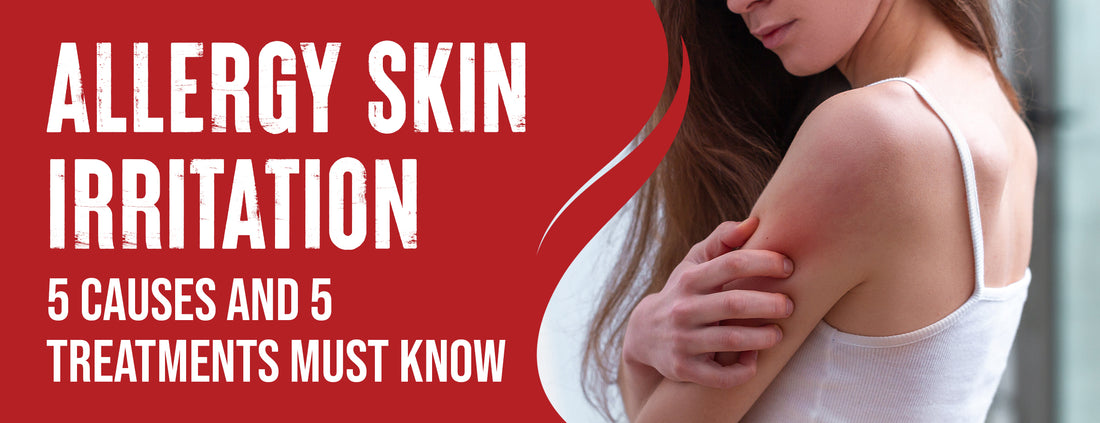













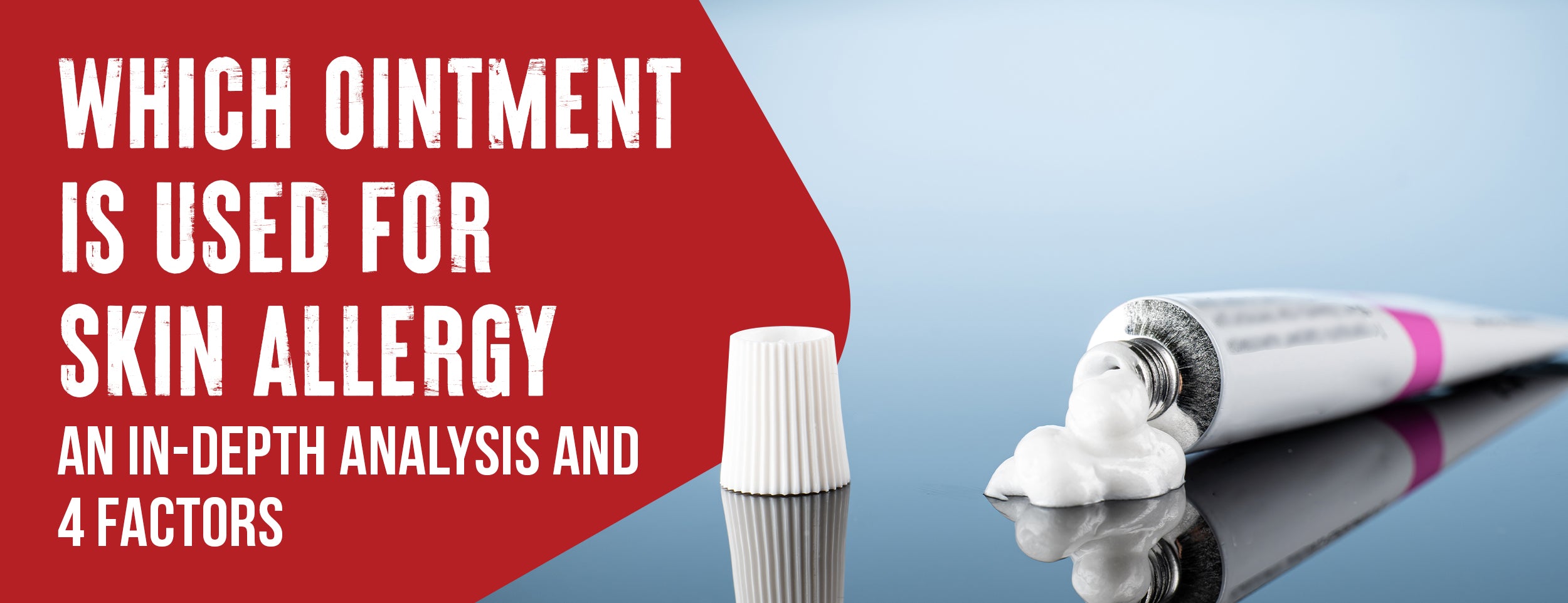
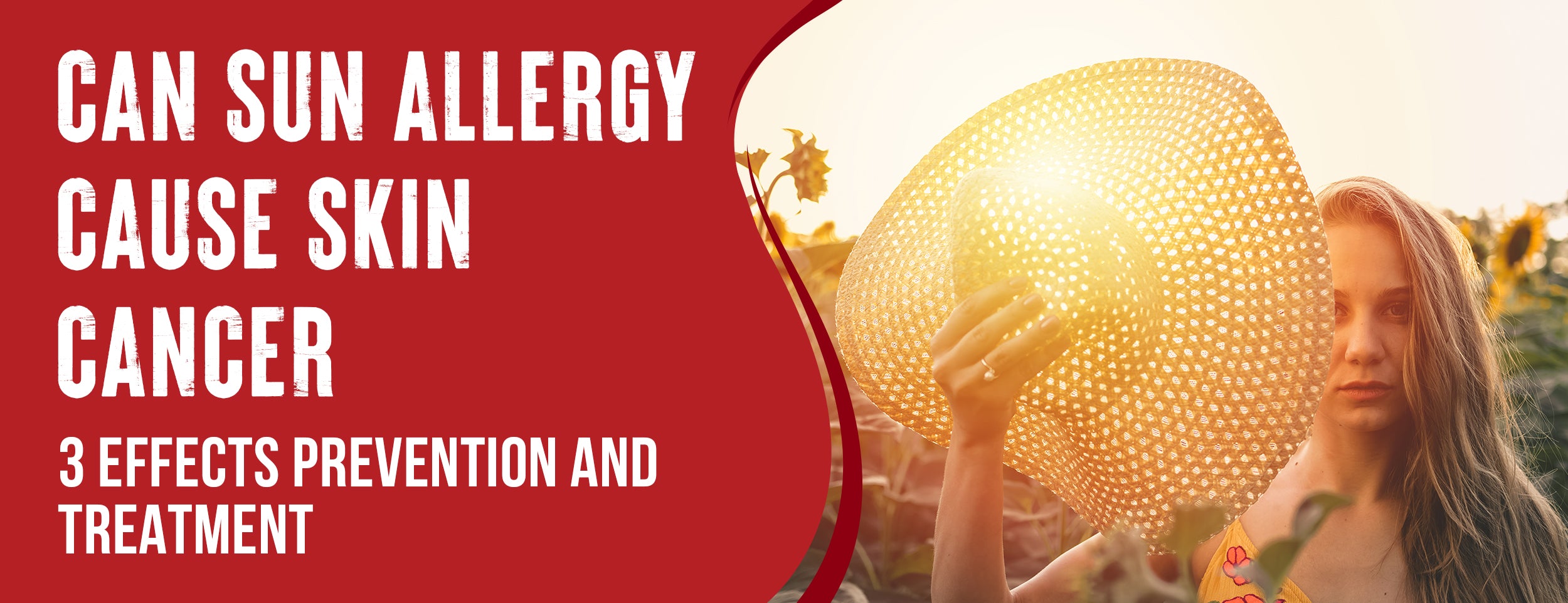
![The Most Common Food Allergies That Cause Itchy Skin [6 Common Symptoms]](http://drnumb.com/cdn/shop/articles/Can_Food_Allergies_Cause_Itchy_Skin__17_Listed_6_Symptoms_Common.jpg?v=1714999986)
